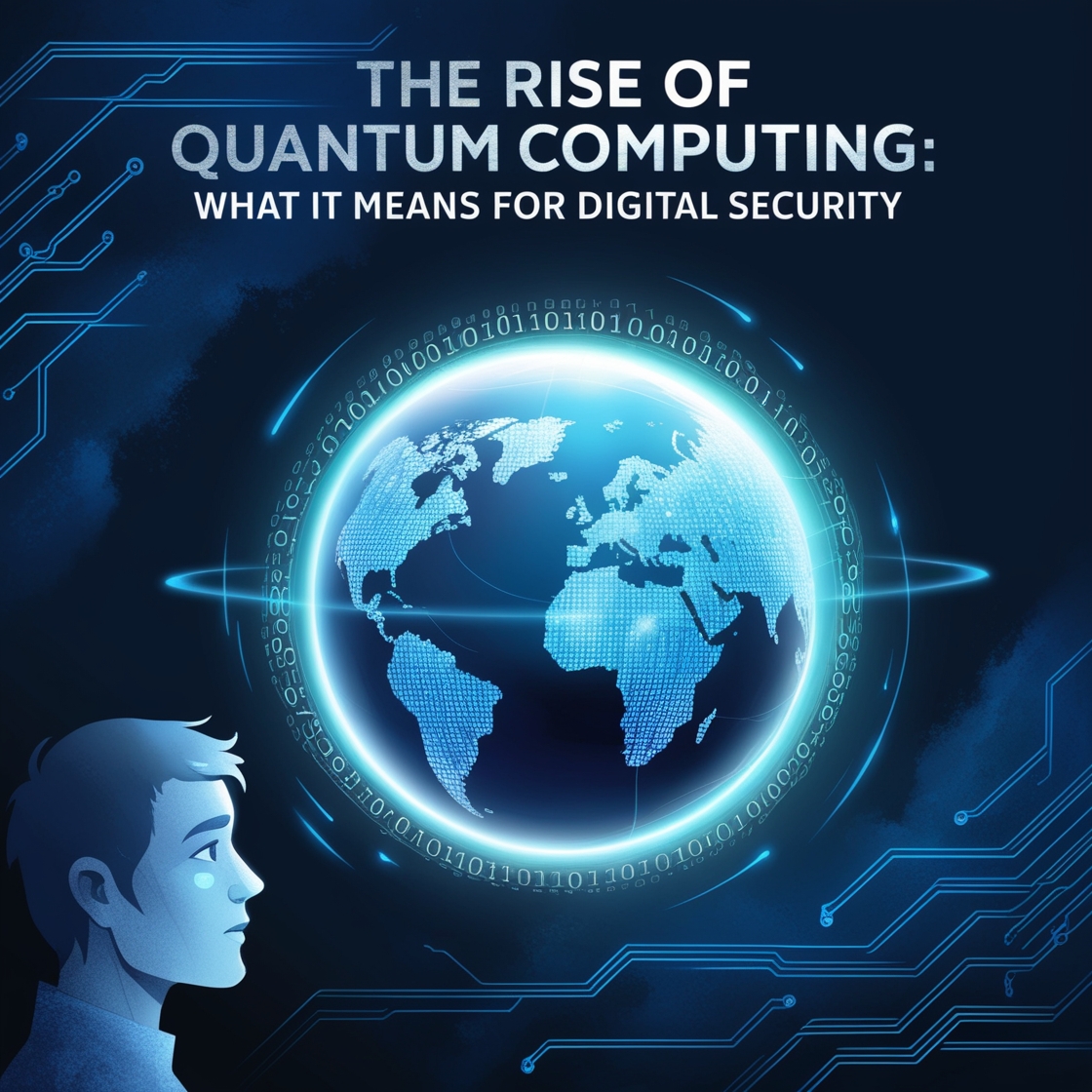Introduction
Quantum computing is rapidly becoming a game-changer in the world of technology, promising to revolutionize industries from pharmaceuticals to logistics. However, with this leap in computational power comes a potential threat to digital security as we know it. This article explores the rise of quantum computing and its implications for cybersecurity, including both the challenges it presents and the potential solutions to safeguard our digital world.
What is Quantum Computing?
Quantum computing is a new form of computation that utilizes the principles of quantum mechanics, the physics that governs the behavior of the smallest particles in the universe. Unlike classical computers, which process information as bits (0s and 1s), quantum computers use qubits, which can represent both 0 and 1 simultaneously, thanks to a principle called superposition. This allows quantum computers to solve complex problems exponentially faster than classical computers.
The Science Behind Quantum Computing
The power of quantum computing lies in two fundamental concepts: superposition and entanglement.
- Superposition allows qubits to exist in multiple states at once, which drastically increases computational possibilities.
- Entanglement is a phenomenon where qubits become intertwined in such a way that the state of one directly affects the state of another, no matter the distance between them.
These features enable quantum computers to perform calculations at speeds unattainable by today’s classical machines.
The Current State of Quantum Computing
Quantum computing is no longer science fiction. Major tech companies like IBM, Google, and Microsoft, along with governments and research institutions, are actively developing quantum technologies. Google, for example, achieved “quantum supremacy” in 2019, solving a problem in seconds that would have taken classical supercomputers thousands of years.
While fully functional, large-scale quantum computers are still years away, the progress is undeniable, and the potential is immense.
How Quantum Computing Impacts Digital Security
Today’s digital security primarily relies on cryptographic algorithms like RSA and ECC to protect sensitive information. These algorithms are based on mathematical problems that are virtually impossible for classical computers to solve in a reasonable timeframe. However, quantum computers could break these encryption methods in a matter of minutes, rendering current digital security obsolete.
Quantum Computing and Encryption
Encryption is the cornerstone of modern cybersecurity. It’s used to secure everything from emails to financial transactions. However, quantum computers pose a significant threat to this security framework because they can easily crack the algorithms that currently protect our data.
Quantum Computing Threat to RSA and ECC
RSA and ECC are widely used encryption techniques that rely on the difficulty of factoring large numbers and solving discrete logarithms, respectively. Quantum computers, using algorithms like Shor’s Algorithm, could break these encryptions, potentially exposing sensitive data across the internet.
Post-Quantum Cryptography
In response to this looming threat, researchers are working on post-quantum cryptography—new cryptographic algorithms designed to be resistant to quantum attacks. These algorithms aim to secure our data in a future where quantum computers are commonplace.
Quantum-Safe Security Solutions
Several quantum-safe security technologies are being developed to protect against the risks posed by quantum computing. Quantum Key Distribution (QKD) is one such technology. QKD uses the principles of quantum mechanics to create encryption keys that are theoretically impossible to intercept or decipher without detection.
Quantum Computing and Blockchain Security
Blockchain technology, which underpins cryptocurrencies like Bitcoin, also faces potential disruption from quantum computing. The cryptographic methods used to secure blockchain transactions could be compromised by quantum computers, leading to vulnerabilities in decentralized systems.
The Role of Governments and Industry in Quantum Security
Governments and industries worldwide are beginning to prepare for the quantum threat. Initiatives like the U.S. National Quantum Initiative and the European Quantum Flagship are funneling billions into quantum research and cybersecurity. Collaboration between industry, academia, and government agencies is crucial to ensure that quantum advancements do not undermine global security.
Ethical and Legal Implications
As quantum computing evolves, so do the ethical and legal challenges. Who will regulate the use of quantum technology? How will we handle quantum-related breaches of privacy? Policymakers are grappling with these questions as they work to develop frameworks for responsible quantum development.
Preparing for the Quantum Future
Organizations need to begin preparing now for the arrival of quantum computing. Investing in quantum research, adopting quantum-resistant cryptographic methods, and staying informed about advancements in the field are all crucial steps for businesses to protect their assets and data.
Quantum Computing’s Potential Benefits for Security
While quantum computing poses a significant threat, it also offers potential benefits for enhancing security. Quantum algorithms could lead to breakthroughs in areas like secure communications and fraud detection, helping create new forms of quantum-safe security that surpass current standards.
Conclusion
The rise of quantum computing is both exciting and daunting. While it promises incredible advancements across industries, it also presents a formidable challenge to digital security. As we move closer to the quantum era, it is crucial for governments, industries, and researchers to collaborate on developing quantum-safe encryption methods and policies that can protect our data in a post-quantum world.
FAQs
- What is the difference between classical and quantum computing?
- Classical computing uses bits that represent either 0 or 1, while quantum computing uses qubits that can represent both 0 and 1 simultaneously.
- Why is quantum computing a threat to digital security?
- Quantum computers can break the cryptographic algorithms that are the foundation of today’s digital security.
- Can we protect our data from quantum attacks today?
- Efforts are being made to develop quantum-resistant cryptographic methods, but most current systems are vulnerable to future quantum attacks.
- How far are we from achieving quantum-safe encryption?
- While research is underway, it may take years before quantum-safe encryption becomes widely implemented.
- What industries will be most affected by quantum computing?
- Industries relying heavily on encryption, like banking, healthcare, and government sectors, will be most affected by quantum computing developments.
